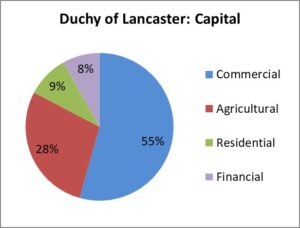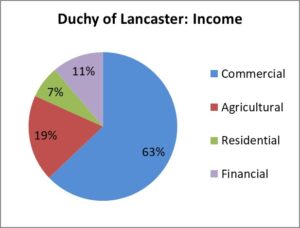Financial
At the end of March 2024, the Duchy of Lancaster had £647.6m of net assets under its control, delivering adjusted net surplus of £27.4m. These take the form of property and financial assets.
The property assets can be broadly divided into agricultural, commercial and residential and include some of the Duchy’s historic foreshore and mineral rights.
Maintaining a balance
The Duchy is continually reviewing and updating the mix of assets under its management. The following pie-charts show the breakdown of capital and income across the Duchy.
The Duchy and The Monarchy
The Duchy is a private estate of land, property and assets incorporated by Royal Charter and held in trust for the benefit of the Monarch as Duke of Lancaster. The Monarch is is entitled to the income generated by His Duchy, but is not entitled to the Duchy’s capital nor to capital profits. Land may be bought and sold, and long leases granted, but sales of assets are strictly controlled and are sympathetic to retaining the Duchy’s core estates. Revenue generation is balanced against the need to provide an income for future generations of Sovereigns.
The net revenues from the property and investment portfolio are paid to the Keeper of the Privy Purse, the member of the Royal Household responsible for managing the Sovereign’s finances. The Sovereign voluntarily pays tax on the income which He receives from the Duchy of Lancaster.
Relevant Legislation
The Crown Lands Act of 1702 placed a bar on the alienation of Duchy assets, restricting the Sovereign to the receipt of income generated by these assets. Later legislation allowed for more flexibility, permitting the sale and purchase of land and the granting of long leases under the Duchy of Lancaster Lands Act 1855 and the subsequent Duchy of Lancaster Act 1988.
The financial affairs of the Duchy are also governed by legislation. The Duchy of Lancaster Lands Act 1855 governs capital transactions for the sale and purchase of land, while the Duchy of Lancaster Act 1817 (known as Viscount Gage’s Act) deals with investment in the improvement of land already owned by the Duchy. Investment in financial assets is governed by the Trustee Act 2000.

